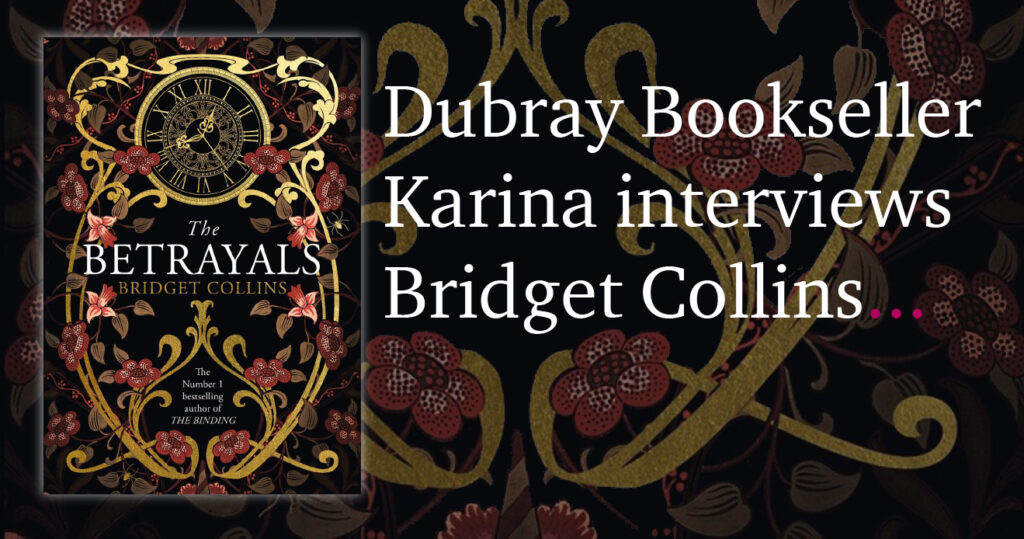
Karina (K): The world building in The Betrayals is so atmospherically written you can vividly see and feel the places described. Are there places in our world that inspired Montverre, or does it spring mostly from your imagination?
Bridget Collins (BC): Thank you! I think the inspiration for Montverre, as with most ideas, came from more than one direction, some real and some imaginary. I suppose the place that it resembles most is la Grande Chartreuse, the monastery in the French Alps – years ago I saw a brilliant documentary called Into Great Silence which really stayed with me, and I wanted to evoke that rarefied, beautiful-yet-slightly-claustrophobic feeling, high in the clear mountain air… But of course Montverre has elements of other places too, not least an Oxbridge college and drama school, both of which are from personal experience! I guess anywhere where people devote their lives to art or study there’s that tension between creativity and devotion on the one hand, and ambition and artistic envy on the other, and that’s what really fascinated me. And finally I suppose Montverre has something in common with other fictional places – like Gormenghast, or even Hogwarts – because it’s not quite knowable, with secrets and hidden corners, almost a character in its own right.
K: The Grand Jeu is at the heart of The Betrayals; it is often described in terms that describe what it is not. The Magister Ludi says “It is not maths, or science, or poetry. It is not art. It is not fiction. It is not performance. It is not even, strictly speak, a game.” What inspired you to create an art form that is so tantalising yet so difficult to define?
BC: I’ve always been interested in games, and especially in that place where games stop being games, when people care so passionately about them that they become something else. But the biggest influence on my conception of the Grand Jeu was Hermann Hesse’s The Glass Bead Game, which I read as a teenager and fell in love with – that idea of devoting your life to this very arcane, mystical form of study, was one that really resonated with me. But I think I brought other experiences into it too: acting, and the headiness of being onstage, and art, and writing too, of course! It was important that it wasn’t defined, partly because defining it would have limited it – I wanted the reader to fill in the gaps themselves, imagining something bigger and more epic than anything specific could have been – and partly because, undefined, it’s more evocative and functions as a metaphor for so many other things.
K: Throughout the story, there is a simmering tension between the main protagonists Léo Martin and Aimé de Courcy Carfax. Although both do terrible things, we never entirely lose sympathy for them – how hard was it to walk that line?
BC: Well, that’s good to hear – I wasn’t sure I’d succeeded! I needed both the main characters to change quite a lot by the end of the book, and so they start off much less sympathetic. (Leo particularly is quite chauvinistic, which isn’t an attractive quality.) But at the same time I wanted the reader to be invested enough to care what happened next, and to feel involved in the unfolding of their relationship – so yes, it was a bit tricky. I hope that, although they both do some nasty things, we can forgive them!
K: What inspired you to write in a world so different yet akin to our own?
BC: I love imagining new places, writing about them as much as reading about them. For me being branded as “escapism” isn’t derogatory at all – it’s a kind of travel for the mind, and just as fascinating and valuable as physical sight-seeing is. (Wasn’t it C. S. Lewis who said, ‘The people most opposed to escape are jailors’?) But in order for that to be true, we also have to recognise that while some things are different, others are fundamentally the same: the surroundings are exotic, but humanity and its preoccupations – love and fear and power – haven’t changed. I love using an imaginary setting to tell a story that couldn’t be told in any other way, but I always cross my fingers that it’s a story which is, on some level, about the real world, here and now.
K: Although the holy places of other faiths are mentioned like the Hagia Sofia, the Al-Aqsa Mosque and the Wailing Wall, Christianity is the faith that is discriminated against in The Betrayals. What inspired that choice?
BC: Various reasons. The first is that I was very conscious of the history of fascism, particularly Nazism, in the 1930’s, and the oppression of the Jews – and in my imaginary world, the Grand Jeu grew out of Christianity in the same way that Christianity shared the roots of Judaism, so that the older religion was the obvious candidate to be scapegoated, supplanted and suppressed. The second is that it’s the tradition which is mine – I’m a Quaker, but I’ve been very influenced by Catholicism and the Church of England – and felt most qualified to write about; it was important to me that I identified with the victims, that I couldn’t brush them aside as people who were part of some other, alien culture. And thirdly, I was interested in particular aspects of Christian dogma, especially the idea of the incarnation. The Betrayals poses (or tries to) questions about what it is to be human, and the thought of the divine in a human body is one that is endlessly evocative and mysterious. In a previous draft it was much more foregrounded, but at that point the book was around 180,000 words and a lot of stuff had to go!
K: As a distinguished writer of young adult fiction, you were longlisted for the 2009 Carnegie award and won the 2009 Branford Boase award. Do you find writing for adults a challenge, or do you find it freeing?
BC: I love it. I loved writing for young adults too, of course, but I originally began writing for that market because it was one of the only places where you could write the sort of genre-bending non-realism I was interested in. At that point the adult market was much more rigid about fantasy or genre fiction. By the time I wrote The Binding that had changed, and something with magical or historical elements could be mainstream and literary – could be taken seriously, in fact. It felt tremendously liberating, particularly as I’ve always, really, written for myself – now I don’t have to second-guess a different audience or try to remember what I would have thought twenty years ago!
K: Do you have a favourite period in history to write about? Or even to read about?
BC: I love to jump around. I feel like, if I had to pick a period to be transplanted into, I’d be most fluent in late-Victorian – but having to choose is like deciding to take your holiday in the same country every year. I’ve written about the Middle Ages, the Renaissance, ancient Egypt, the 1930’s, the 1990’s, the nineteenth century and the future, and I thoroughly enjoyed visiting all of them. And I’ll read anything, set in any time, if it’s a good story.
K: And finally, the name Bridget Collins sounds as if you may have an Irish connection – would there be any truth to that?
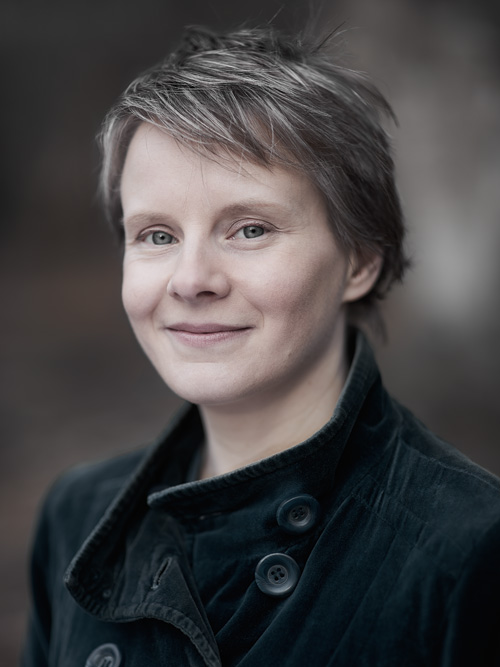
BC: Yes! My paternal grandmother was Irish and I’m currently compiling the paperwork to apply for citizenship. In fact the “Collins” bit comes from my paternal grandfather, who was English, and on my mother’s side I’m distantly related to the Butlers and the Earls of Ormonde, so I’m sort of a-quarter-and-a-bit Irish. And very proud of it.
K: Thank you for taking the time to answer these questions; I loved spending time in the worlds of The Binding and The Betrayals and I look forward to sharing my passion with our customers in Dubray!
BC: Thank you for having me – it was a pleasure!
Bridget Collins trained as an actor at the London Academy of Music and Dramatic Art after reading English at King’s College, Cambridge. She is the author of seven acclaimed books for young adults and has had two plays produced, one at the Edinburgh Festival Fringe. Bridget Collins’ first adult novel, The Binding, was a UK number 1 bestseller and an Irish Top 10 Bestseller. The Betrayals is her second adult novel.



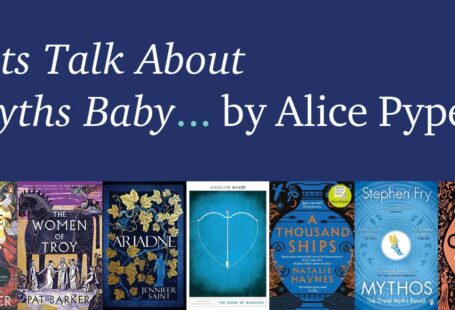
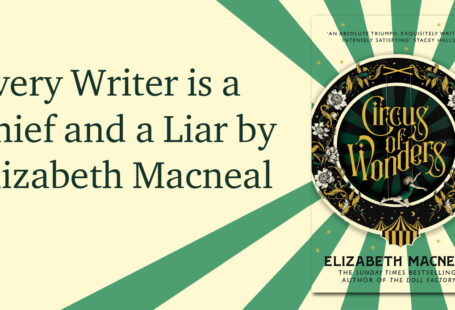
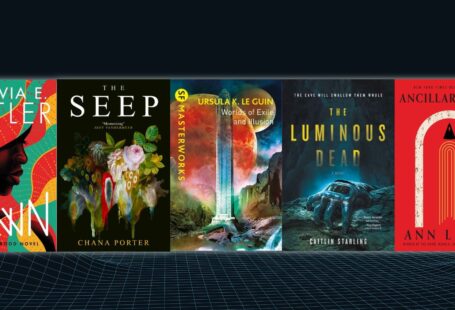
Recent Comments